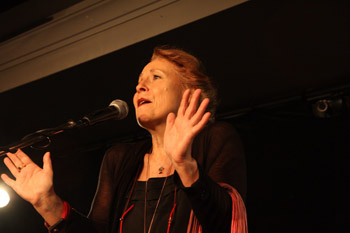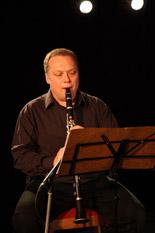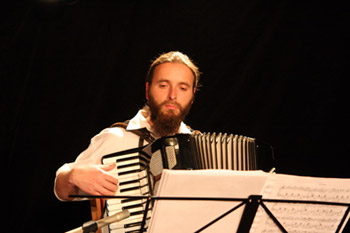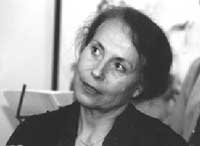 |
||||
| Biography | Trailers | Concerts | Documentation | Performances |

Yiddish THREESOMEwith Accordion and ClarinetA new approach to a concert of Yiddish songs named Yiddish Threesome, a project of HANA FREJKOVÁ, actress, singer and author of the reflexive book "Divný kořeny" (Strange Roots Torst 2007). Yiddish Threesome is the third musical assembly from 1996 where Hana Frejková sings Yiddish songs - more dynamic and authentic with accordion and clarinet that are closely connected with jewish music and directly call upon a strong expressional style. These musical instruments of klezmer musicians and scrapers performing music in pubs, courtyards and on streets provide these songs with unforgettable charm of music for the rich and the poor and form an inimitable mood. Hana Frejková will introduce you Jewish songs that relate to ups and downs of human lives with irony, wit and even nostalgia. Clarinetist Milan Potoček plays in jazz-rock big band Savle Mece, in Blues Wave band (keyboard), he devotes also to composing and arranging, Accordionist Slávek Brabec is a member of the Prague accordion and keyboard orchestra Praco, plays in music bands Pilgrim Pimple, Psychohlína and the quartet Zeffiro. The group was later appended by a secondo, Marianna Borecká, Hana Frejková’s daughter who studied molecular biology and at the moment is working on her PhD theses. http://hanafrejkova.cz 




Yiddish THREESOMEThis is an invitation for a concert of Yiddish songs named Yiddish at the THREE, a project of HANA FREJKOVÁ, actress, singer and author of the reflexive book "Divný kořeny" (Strange Roots) (Torst 2007). Together with her colleagues Milan Potoček (clarinet), and Slávek Brabec (accordion),she will introduce you Jewish songs that relate to ups and downs of human lives with irony, Hana Frejková glosses the concert with Jewish phrases and jokes. She also uses the glossary of the book Jidiš pro radost (Yiddish to enjoy) enabling her to explain some expressions of this Unique language. Leo Rosten, its author, especially known with his book "The Education of H*Y*M*A*N K*A*P*L*A*N " (Pan Kaplan má třídu rád), is really an exceptional teller. And i tis not by chance that clarinetist Milan Potoček and accordionist Slávek Brabec now participate in realizing a very successful performance with same name in the Prague theatre Městská divadla pražská. Both these instruments, accordion and clarinet, are closely connected with Jewish songs, belonging to klezmers, pipers and fiddlers, who played music at pubs, on courtyards and on streets. They add unforgettable charm of music for the rich and the poor and create irreplaceable mood. From the book The Joys of Yiddish by Leo Rosten: For the benefit of innocents, I hasten to add that Yiddish and Hebrew are entirely different languages. A knowledge of one will not give you even a rudimentary understanding of the other. True, Yiddish uses the letters of the Hebrew alphabet, employs a great many Hebrew words, and is written, like Hebrew, from right to left. But Yiddish and Hebrew are as different from each other as are English and French, which also use a common alphabet, share many words, and together proceed from left to right. Nor is Yiddish a synonym for Jewish. Yiddish is the name of a language. Technically speaking, there is no language called Jewish. Strictly speaking, Jews do not speak Jewish any more than Canadians speak Canadian, or Baptists read Baptist. But it would be foolish to deny that in popular English usage, Jewish is used as a synonym for Yiddish. After all, Yiddish comes from the German Jüdisch, meaning Jewish, and in the Yiddish language itself Yiddish means Jewish. We may as well accept reality. Mame-loschen, that’s Yiddish...
|
||||
|
|
design © Jan & Tomáš Řezáčovi | |||

